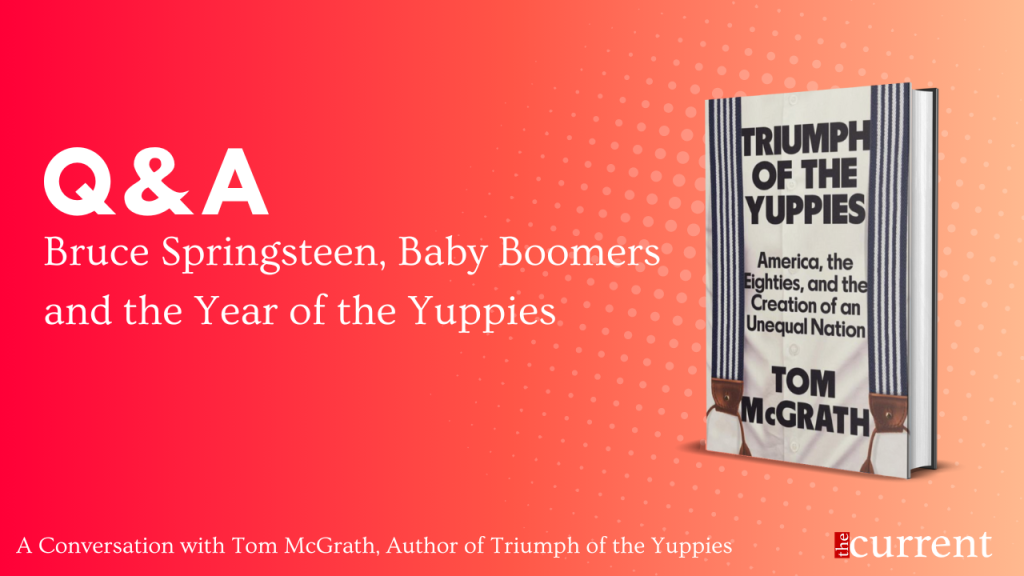Bruce Springsteen, Baby Boomers and the Year of the Yuppie: A Conversation with Tom McGrath

Brimming with lively and nostalgic details, Triumph of the Yuppies charts Boomers’ transformation from hippy idealists in the late 1960s to careerists in the early 1980s, and details how marketers, the media, and politicians pivoted to appeal to this influential new group. We spoke to Tom McGrath to talk through the masterful history that reveals how Yuppies reshaped American society where the Yuppies are now over 40 years after their cultural boom.
Q: What inspired you to write “Triumph of the Yuppies”? How do you describe yuppie culture in the context of your book?
I was in college when Yuppies became a cultural phenomenon in the 1980s, and while I was too young (and too poor!) to be a Yuppie, I was aware something significant was happening.
I wrote this book because it’s clear to me now that so much of what characterizes our world today —historic income inequality, political division, the dominance of an educated elite when it comes to our economy — has its roots in that period. There was a cultural and structural shift that took place in the ’80s, and I wanted to tell the story of how that happened.
And Yuppies were at the center of all that. They were all about “success” – in your career, your financial life, where you lived, what you wore, what you ate. It was all about living an “elevated” life – and not paying much attention to anyone else.
Q: What were some of the trends, tastes, and values that defined the group? Where did the yuppies hunger for success come from?
Yuppieness really emerged out of two things. One was generational – Yuppies were Baby Boomers, and Boomers (the largest generation in American history to that point) had been told from the time they were born that the world was theirs for the taking.
But in the 1970s, that promise faced severe headwinds in the form of a struggling American economy. There became a sense that success was a zero-sum game. In order to get what they’d been promised, Yuppies – the elite, most well-educated members of the generation — doubled-down on their commitment to career and financial success. Unfortunately, their success often came at the expense of other people.
Q: In the early 80s, there was an influx of yuppies moving to larger cities for career opportunities. Can you discuss the impact of this on urban development and gentrification in major cities? Do we feel the implications of this change today?
One of the things that drove Yuppies was a desire not to be like their parents — not to live in the bland, homogenized suburbs where many of them had grown up. Instead, in the mid-1970s, a small group of young professionals began gravitating toward cities. They loved the architecture of old brownstones and lofts. They loved how cosmopolitan it all felt. And cities were where the best new jobs were.
It kicked off waves of gentrification that we still see and experience today, with real estate values skyrocketing, neighborhoods changing, and working-class and lower-income people being displaced from areas where they once lived.
By the time their obituary was being written in the late 1980s, Yuppies—the elite, uber‑educated faction of the Baby Boom generation—had become a cultural punchline. But amidst the Yuppies' preoccupation with money, work, and the latest status symbols, something serious was happening, too, something that continues to have profound ramifications on American culture four decades later.
Q: The 80’s also marked the start of Ronald Reagan’s presidency including his policies that largely benefited the wealthy and cuts that directly impacted the poor and middle class. How were Reagan and his policies received? How did everything change as we entered the recession of 1981?
The recession of 1981-82 remains an underappreciated turning point in American life. Millions of manufacturing jobs were lost in the downturn, and even as the broader economy recovered, many of those jobs never came back. Economically, there became a clear divide between professionals with college educations and working-class people who never went past high school. That’s a divide we still see and feel to this day.
Politically, Yuppies were often socially liberal and economically conservative. In 1984’s Democratic Presidential primary, many of them were attracted to Gary Hart, who positioned himself as a new kind of Democrat and distanced himself from the labor-friendly, New Deal policies that had defined the Democratic Party for 50 years. When Hart lost the nomination to Walter Mondale, many Yuppies switched their allegiance to Reagan in the general election. Many thought his economic policies gave them a better chance of succeeding economically – even though Reagan’s policies hurt a lot of Americans at the lower end of the economic spectrum.
Q: The title of the book suggests a victory in yuppie culture, peaking when Newsweek dubbed 1984 “Year of the Yuppie”. How quickly after this did yuppie influence begin to cool off in mainstream society?
1984 was definitely the height of Yuppieness as a cultural phenomenon. There was endless media coverage about Yuppies; companies geared their strategies and marketing campaigns to appeal to Yuppies; cities tried to lure them; politicians tried to appeal to them.
But soon came a backlash: the vast majority of Americans – who were not Yuppies — rolled their eyes as Yuppies’ smugness, materialism and self-centeredness. Yuppie jokes started making the rounds. The word “Yuppie” itself went from being a benign descriptor to a perjorative. To call someone a Yuppie was an insult.
The irony? Even though Yuppieness faded as a phenomenon, the values that Yuppies embraced — an obsession with financial success, putting yourself first — didn’t go away at all. In fact, they continue to define our culture 40 years later. More to the point: the well-educated elite became the center of power in America, and they largely created a country that worked well for themselves, but not so well for anyone else.
Q: There are mentions of Bruce Springsteen, Madonna and MTV throughout the book. How did media and pop culture feed the yuppie machine in the early 80s to gain popularity?
I really wanted to capture the zeitgeist of the ’80s, and pop culture was a great way to do that. Madonna and MTV really spoke to the slickness and materialism of the decade. In great contrast to the ’60s and ’70s, the ’80s were all about image.
Springsteen represents the flip side of that. As Reaganomics took hold, as the recession decimated many parts of the country, Springsteen spoke out on behalf of working people and talked during his concerts about the American Dream. Was it about a few people getting rich? Or was it about many people being able to lead decent, dignified lives?
Q: Where are the Yuppies now?
I think Yuppieness lives on in two ways.
First: The original Yuppies (many of whom are retired) are part of the comfortable upper and upper-middle classes. Many of them continue to live in large metro areas, or in more affluent sections of the Sunbelt.
We also see a version of Yuppieness in today’s young professionals. Their aesthetic sense might be different from their parents (’80s glitz has been replaced by texture and authenticity). Their politics might be different (more progressive than earlier generations). But they’re more interested than ever in wellness and upscale food culture. They still embrace the cosmopolitan vibe of city living. They’re still focused on status. Most importantly, they still comprise an economic and cultural elite who dominate the country.

